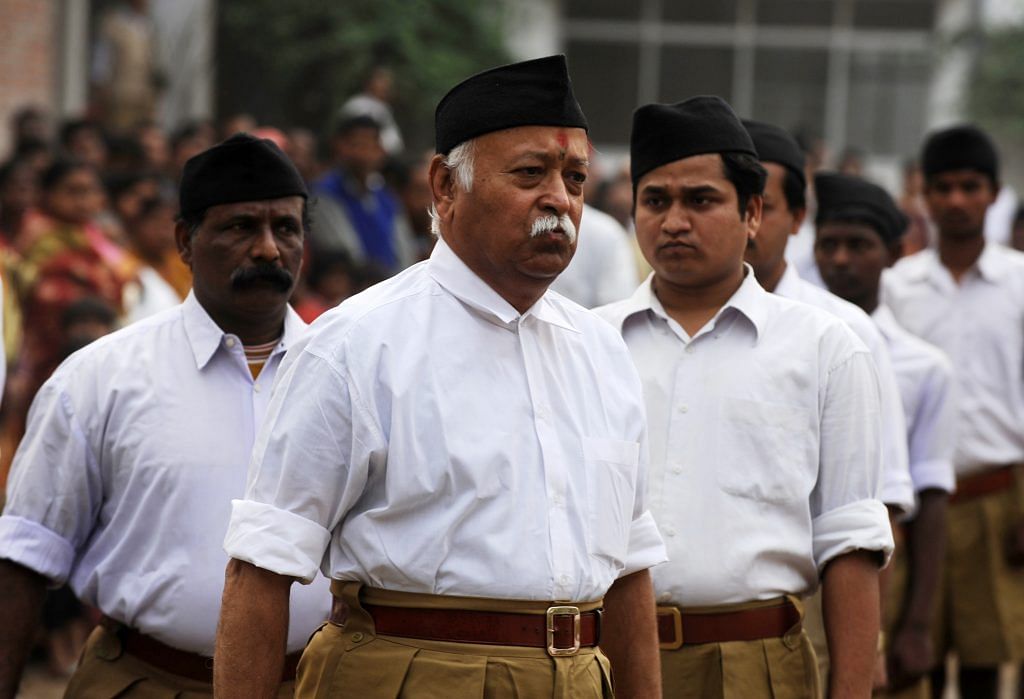New Delhi: The Rashtriya Swayamsevak Sangh (RSS), considered by many to be the mainstay of the Bharatiya Janata Party’s bid to come back to power in 2019, may not be looking at the general elections in quite the same way the BJP is.
For the RSS, this election is not about ‘Modi vs the rest’, but a larger battle of ideological forces. It believes there are two kinds of forces on the national spectrum right now. One comprises those who don’t believe India is a nation, and consider it to be a conglomeration of sub-nationalities and hence want to break the nation. The other comprises ‘nationalist’ forces who believe India is a nation with more than 5,000 years of history, and that deliberate fault lines are being created to divide the society.
“These fault lines were created during the colonial era and perpetuated during Congress regimes post-Independence under the influence of the Left, which occupied most of the institutional space, especially in academia,” said a senior RSS functionary, sharing the organisation’s viewpoint on the 2019 polls.
“After the 2014 victory of the BJP, all of them have come together against the BJP led by Narendra Modi, which made a concerted effort to evict the ultra-Left from the institutional space and alter the national discourse.”
Also read: Material mindset causing ‘unchecked desires’, stress and divorce, says RSS
Distinct pattern
The RSS has been carefully analysing events across the country since 2014, and sees a distinct pattern — whether in Bhima-Koregaon, campaigns on mob-lynching, the JNU controversy or various Dalit movements taking a violent turn.
“It all begins with a social media campaign, followed by activities on the ground level in the form of a public rally, which very often ends up in violence. This is immediately followed by a campaign in the media and at various other public platforms by the ultra-Left section of intelligentsia justifying the violence and strengthening the fault lines between different sections of our society,” said another senior functionary of the Sangh.
The RSS believes these radical forces should not be taken lightly. They do make a strong political impact, as happened during the assembly polls in the three heartland states last year. The BJP lost all three states — Madhya Pradesh, Chhattisgarh and Rajasthan.
More significantly for the RSS, the BJP lost 26 out of 29 tribal seats in Chhattisgarh and almost half the seats in tribal areas in Madhya Pradesh too. These were considered to be the party’s strongholds, thanks to the Vanvasi Kalyan Ashram, a pan-India organisation run by swayamsevaks for the welfare of the tribal people.
These losses in tribal areas, according to the RSS’ analysis, were mainly the outcome of the emergence of a nexus comprising Maoists, ultra-Left and Christian missionaries.
The RSS believes the BJP’s losses had less to do with the anti-incumbency against its governments and more with the meticulous campaign of all these forces, which backed the Congress. The belief in the RSS is that they would back any one who can defeat the BJP.
Also read: Ayodhya, ghar wapsi, gau raksha: How BJP, RSS & affiliates used Kumbh Mela to push Hindutva
‘Don’t underestimate rivals’ strength’
Thus, the RSS has sounded an alert to its cadres not to underestimate the strength of the rival forces.
“Their activities may not be visible to others but we know how well-organised they are, and to what extent they can go to defeat the BJP in these polls, so that they can continue implementing their agenda of breaking this country and dividing the society unabated under the patronage of a non-BJP government,” said a senior functionary of the RSS.
“For us, it is clear that a BJP government in power would ensure that the narrative pursued by the radical forces in the country wouldn’t be patronised by the government of the day. The rest of the battle on the ideological front would be fought by us,” added another functionary who has been closely tracking the ‘rival forces’.
“This election is crucial as an emphatic victory for the Modi-led BJP is important to create a conducive atmosphere, where the nationalists can finish off this ideological battle.”
A war of ideologies
In a nutshell, the RSS is looking at the 2019 polls as one of the crucial battles which will have an impact on the larger war of ideologies.
The RSS feels that a victory for Modi-led BJP would ensure that it doesn’t have to divert its energy to deal with a hostile government at the centre. It believes this is what happened during the decade-long UPA regime, when the “bogey of saffron terror” was raised to target the RSS.
A BJP-led government at the centre would help it be more focused on the long-drawn ideological war which is already underway, and is likely to continue more fiercely, whatever may be the outcome of the 2019 polls.
(The writer is CEO of the Indraprastha Vishwa Samvad Kendra)
